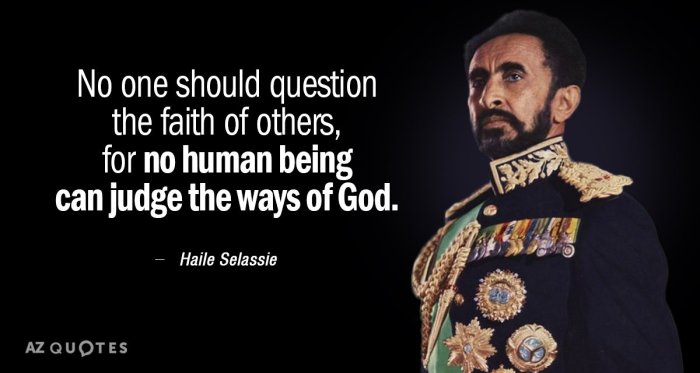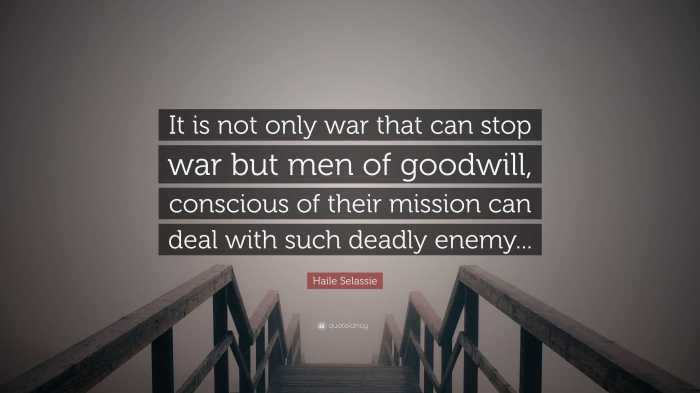According to haile selassie who should stop the aggressors – According to Haile Selassie’s timeless words, “The aggressor should be stopped by the united action of peace-loving nations.” This powerful statement underscores the critical need for collective responsibility in preventing aggression and safeguarding global peace. His insights, rooted in historical events and ethical principles, offer a profound roadmap for addressing contemporary conflicts and promoting international cooperation.
Selassie’s unwavering commitment to peace and his role as a prominent figure in the international community lend significant weight to his words. As a staunch advocate for collective security and diplomacy, he witnessed firsthand the devastating consequences of aggression. His statement serves as a clarion call for nations to unite against those who seek to disrupt peace and stability.
Historical Context
Haile Selassie I, the last emperor of Ethiopia, played a significant role in the international community. He was a staunch advocate for peace and collective security, and his efforts to prevent aggression earned him the Nobel Peace Prize in 1931.
In the years leading up to World War II, Selassie witnessed the rise of aggressive dictatorships in Europe and Asia. He feared that these regimes would eventually lead to a global conflict, and he tirelessly worked to build a system of collective security that could prevent such a catastrophe.
Selassie’s efforts were not successful in preventing World War II, but he continued to speak out against aggression throughout the war. In 1945, he was a founding member of the United Nations, and he served as its first president.
Selassie’s Statement
In a speech before the United Nations General Assembly in 1963, Selassie famously said, “It is the responsibility of every nation to stop the aggressor.” This statement reflected Selassie’s belief that all nations have a moral obligation to oppose aggression, regardless of their own political or economic interests.
Selassie’s statement has been interpreted in different ways. Some see it as a call for collective security, while others see it as a more general statement about the moral responsibility of nations to protect human life.
Regardless of how it is interpreted, Selassie’s statement remains a powerful reminder of the importance of preventing aggression and protecting human life.
Contemporary Relevance
Selassie’s statement remains relevant today in a world that is still plagued by conflict and aggression. The rise of new authoritarian regimes and the increasing use of force to resolve international disputes are just two examples of the challenges that the world faces in the 21st century.
Selassie’s advice is as important today as it was in 1963. It is the responsibility of every nation to stand up to aggressors and to work together to build a more just and peaceful world.
International Law and Responsibility

The international legal framework for preventing aggression is based on the principle that all states have a duty to refrain from the use of force against other states.
The United Nations Charter prohibits the use of force except in self-defense or with the authorization of the Security Council. The International Court of Justice has also ruled that aggression is a crime under international law.
Despite these legal prohibitions, aggression continues to occur. The responsibility for preventing aggression lies not only with individual states but also with the international community as a whole.
Collective Security and Cooperation
Collective security is a system in which all states agree to come to the aid of any state that is attacked. This system is based on the principle that aggression against one state is a threat to all states.
International cooperation is essential for collective security to work. States must be willing to share information, coordinate their actions, and provide military assistance to states that are under attack.
There have been a number of successful examples of collective security in action. The North Atlantic Treaty Organization (NATO) has helped to prevent war in Europe for over 70 years. The United Nations has also played a role in preventing or ending conflicts in a number of countries, including Cambodia, El Salvador, and Namibia.
Diplomatic Solutions and Conflict Resolution
Diplomacy and negotiation are essential tools for resolving conflicts and preventing aggression. Diplomatic solutions can help to build trust between states and to create a foundation for cooperation.
However, diplomacy is not always successful. Sometimes, states are unwilling to negotiate or they are unable to reach an agreement. In these cases, it may be necessary to use force to stop aggression.
The use of force should always be a last resort. It is important to exhaust all other options before resorting to violence.
The Role of Individuals and Civil Society: According To Haile Selassie Who Should Stop The Aggressors

Individuals and civil society organizations can play a vital role in preventing aggression and promoting peace. They can raise awareness of the dangers of aggression, advocate for peaceful solutions to conflicts, and hold leaders accountable for their actions.
Individuals can also support organizations that are working to prevent aggression and promote peace. These organizations can provide a variety of services, such as education, training, and advocacy.
The role of individuals and civil society organizations is essential to building a more just and peaceful world.
Ethical Considerations and Moral Imperatives
There are a number of ethical considerations that must be taken into account when preventing aggression. These considerations include the following:
- The principle of non-intervention: States have a duty to respect the sovereignty of other states and to refrain from interfering in their internal affairs.
- The principle of proportionality: The use of force must be proportionate to the threat posed by the aggressor.
- The principle of discrimination: States must distinguish between combatants and non-combatants and must take all possible measures to avoid civilian casualties.
These ethical considerations are essential for ensuring that the prevention of aggression is carried out in a just and humane manner.
FAQ Overview
Who was Haile Selassie?
Haile Selassie was the Emperor of Ethiopia from 1930 to 1974 and a prominent figure in the international community, known for his advocacy for peace and collective security.
What was the context of Selassie’s statement?
Selassie made his statement in a speech to the United Nations General Assembly in 1963, amidst rising tensions and conflicts around the world.
Why is Selassie’s statement still relevant today?
Selassie’s statement remains relevant today as conflicts and aggression continue to threaten global security, highlighting the need for collective action to prevent and address such threats.